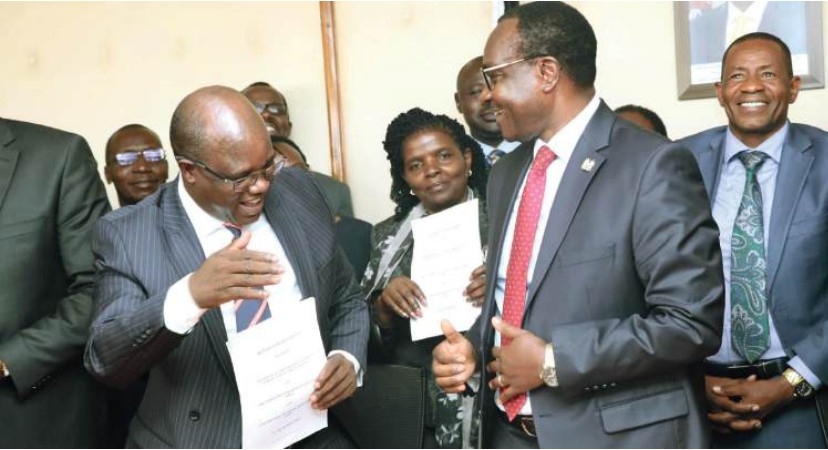

The Court of Appeal has temporarily suspended a portion of a High Court ruling that declared certain sections of the Public Benefit Organizations (PBO) Act unconstitutional.
The suspension allows the PBO Authority’s Board to continue functioning administratively but bars it from exercising its quasi-judicial powers pending the outcome of the appeal.
Quasi-judicial powers enable administrative agencies to resolve disputes, determine rights, and impose liabilities in a manner similar to courts.
In a consent order recorded before the Court of Appeal in Nairobi, the parties agreed to vary a section of the High Court’s April 30 judgment, which had nullified the composition of the PBO Authority’s Board.
“For avoidance of doubt, the Public Benefit Organizations Regulatory Authority Board shall continue exercising and discharging its functions except its quasi-judicial function under the Public Benefit Organisations (PBO) Act, 2013,” ordered Justices Gatembu Kairu, Pauline Nyamweya, and Aggrey Muchelule.
All other declarations made by the High Court remain in effect, meaning provisions of the PBO Act on mandatory re-registration of NGOs, disclosure of certain private information, and enforcement powers remain invalid and unenforceable. The appeal has been certified for priority hearing.
The consent, reached between the PBO Authority and civil society petitioners led by David Calleb Otieno and the Civil Society Reference Group, temporarily clarifies a legal dispute that has unsettled governance in Kenya’s nonprofit sector.
The dispute stems from the April 30, 2025, High Court ruling, which declared several provisions of the PBO Act unconstitutional.
The court faulted sections that required previously registered NGOs to re-register, demanded disclosure of board members’ residential and business addresses, and granted the regulator extensive enforcement powers without guaranteed fair hearings.
Justice Bahati Mwamuye, who delivered the judgment, held that these provisions failed the test of constitutional proportionality and violated rights to privacy, fair administrative action, and freedom of association.
The court also found that the PBO Authority’s Board was improperly constituted.
The High Court noted that the Board exercises quasi-judicial functions, including hearing disputes and determining registration status, and should therefore be constituted through an independent process similar to tribunal appointments under the Judiciary.
The court declared the existing Board unconstitutional and directed it to cease operations.
The High Court issued 14 declarations under paragraph 85 of its judgment, reshaping Kenya’s civil society regulatory landscape. Among the invalidated provisions were: Fifth Schedule paragraphs 5(1) and 5(2), requiring all previously registered NGOs to re-register within a specified period; Section 32, compelling disclosure of officials’ physical addresses; Sections 18 and 19, granting the Authority powers to suspend or deregister organisations without procedural safeguards; and Section 35, relating to the composition of the Authority’s Board.
The court ruled that these provisions were inconsistent with Articles 31 (privacy), 36 (freedom of association), 47 (fair administrative action), and 50 (fair hearing) of the Constitution.
The PBO Authority and the Attorney-General appealed, arguing that immediate enforcement of the ruling would disrupt the regulator’s operations and create a governance vacuum in a sector overseeing significant public and donor funds.
In an affidavit, the Authority noted that halting the Board’s functions could disrupt administrative operations, contractual obligations, and compliance with international standards, including anti-money laundering rules set by the Financial Action Task Force (FATF).
The High Court initially granted a 60-day stay of its judgment on May 14, 2025, later extended to August 8, 2025, to allow for appeal filings.
When that period lapsed, the Authority moved to the Court of Appeal on August 4, 2025, seeking further suspension.
The petitioners opposed a full stay, maintaining that the High Court’s declarations protect fundamental freedoms potentially threatened by executive overreach.
They noted that the PBO Board’s structure could undermine judicial independence, as the Board exercises quasi-judicial functions while a majority of its members are appointed by the Executive. They argued that the regulator could continue administrative functions without reverting to unconstitutional practices.
Lawyer Kevin Oriri, representing David Calleb Otieno, the Civil Society Reference Group, and the National Public Benefit Organisations Consortium, said civil society organisations have played a key role in Kenya’s reform process, and safeguarding their autonomy supports democratic principles.
The November 10 consent order represents a compromise, suspending only the declaration invalidating the Board’s constitutionality while restricting its powers to administrative functions. Quasi-judicial functions, such as hearing registration appeals or disputes over suspension or deregistration, remain on hold pending the appeal.
Legal analysts note the order allows the regulator to continue day-to-day operations while respecting constitutional concerns raised by civil society. It also ensures that the broader High Court findings, including privacy protections and the removal of mandatory re-registration clauses, remain effective.
The case is regarded as a significant test of Kenya’s post-2010 constitutional framework, particularly regarding the balance between State oversight and the autonomy of civil society organisations.
Should the Court of Appeal uphold the High Court ruling, the government will need to restructure how boards and tribunals exercising quasi-judicial powers are constituted, with involvement from the Judicial Service Commission to ensure independence.
If the appeal succeeds, the State could regain broader authority to appoint and oversee such boards, potentially reshaping the regulatory framework for nonprofits.


















